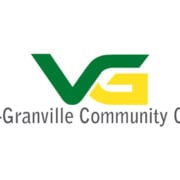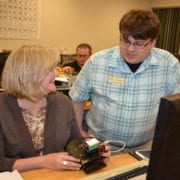VGCC surpasses $6 million in grant funding with new initiative
Vance-Granville Community College’s Grants Office has now surpassed $6 million in funding to support students, the VGCC Board of Trustees was informed on Monday night, Jan. 23, at its regular bimonthly meeting on Main Campus.
In its brief four-year history, the Grants Office has secured 37 grants totaling $6,053,883, according to Dr. Ken Lewis, Vance-Granville’s vice president of institutional research and technology.
Among the largest grants, $1,757,299 from the U.S. Department of Labor’s Trade Adjustment Assistance Community College and Career Training (TAACCCT) Grant Program is the single largest competitive grant award received in the history of the college. TAACCCT supports the development of innovative training programs for advanced manufacturing careers. The college started its Mechatronics program and expanded its Welding program through the grant.
The Advanced Manufacturing Skills Training Alliance (AMSTA) with the four public school systems in the college’s coverage area was created with a $1.2 million grant from the North Carolina Education and Workforce Innovation Fund. In addition, $460,000 has been awarded to the Training Alliance by the Golden LEAF Foundation, along with grants of $245,923 and $237,757 from the Duke Energy Foundation to purchase state-of-the-art equipment.
And, most recently, VGCC was awarded nearly $1 million from the U.S. Department of Labor to launch the North Carolina TechHire Program to train students in information technology and advanced manufacturing programs.
In addition to the TechHire grant, Dr. Lewis said the most recent awards include:
- A pair of Male Mentoring Success Initiative grants over two years, totaling $34,000, to help students stay in school and on track to graduate or transfer to a four-year university;
- A Wake Electric grant of $3,000 to fund classroom technology;
- An NC Works Career Coach grant of $17,000 in partnership with the Granville and Warren County school systems to promote college attendance and Career & College Promise (CCP) classes in the high schools;
- A Perkins grant, $181,000, supporting the college’s Business and Applied Technologies and Health Sciences curriculum programs;
- A Library Services and Technology Act planning grant of $23,000 for space utilization upgrades;
- A Cannon Foundation grant of $150,000 to complete renovation of Main Campus Building 10;
- A National Summer Transportation Institute grant from the Federal Highway Administration, $37,000, allowing high school students in Warren County to learn more about career opportunities in transportation-related industries; and
- A Taste of Industry grant of $10,000 from the North Carolina Community College System to support AMSTA in conjunction with Granville County Schools.
The grants update was included in the report of the Curriculum Committee, chaired by Barbara Cates Harris. In the committee’s reports, Dr. Angela Ballentine, the college’s vice president of academic affairs, also updated the board on the annual Continuing Education and Basic Skills visitation report.
Building Improvements
The board approved recommendations of the Building Committee, chaired by Trustee Donald Seifert, ranking in priority order the firms to design and oversee exterior masonry repairs and restoration as well as HVAC replacements and fire alarm system installations. Both Main Campus projects will be funded by the Connect NC bonds approved by state voters in March 2016.
At an estimated cost of $1 million, the college plans to restore, structurally repair and waterproof building masonry roof lines, walls and building bridges that have deteriorated over time because of the penetration of water/moisture into and through the building structures. REI Engineers of Raleigh was chosen as the highest ranked firm for the masonry project.
The primary focus of the HVAC/fire alarm project, estimated to cost $4.1 million, is to replace existing deteriorated heating, ventilation and air conditioning (HVAC) systems with new systems that provide greater stability, control and energy efficiency, and to replace existing fire alarm systems with new addressable systems that meet state code compliance. Engineered Designs, Inc., of Cary was selected as the highest ranked firm for the project.
VGCC is receiving $7.6 million from the $2 billion Connect NC Public Improvement Bond package. Funds may be used for the repair and renovation of facilities to meet the educational needs of students and/or the construction of new facilities to expand programs and services.
Other Action
In other action:
- The board approved Mid-Year Amendments to the 2016-2017 Budget. The adjustments were necessary to account for $1,664,312 in carryover funds from the previous year and grant funding.
- Trustee Sara Wester, chair of the Personnel Committee, reported on new employees and resignations.
- Trustee Opie Frazier, chair of the Investment Committee, reported a gain on the college’s investments now being managed by First Citizens Wealth Management.
- Dr. Stelfanie Williams, VGCC’s president, updated the trustees on activities since the board last met in November. She also announced the dates of upcoming events: a Valentine’s Day Luncheon sponsored by the college’s Culinary Arts program, Feb. 16; a North Carolina Association of Community College Trustees Law and Legislative Seminar in Raleigh, March 29-31; the fifth annual Dinner Theater, April 27-28, in the Civic Center on Main Campus; the annual VGCC Endowment Fund Golf Tournament, May 2, at the Henderson Country Club; and Commencement, May 12, at the gazebo on Main Campus.
The next meeting of the Board of Trustees is set for Monday, March 20, on the Main Campus.
— END —


